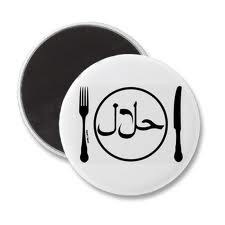 The other night I listened to a program on BBC Radio 4 UK which was entitled “The Future Is Halal”. People associate the word halal with meat. Usually it is just thought of as a term that defines how animals have been slaughtered in accordance to Islamic law . However halal actually means something a lot broader. According to Wikipedia ”
The other night I listened to a program on BBC Radio 4 UK which was entitled “The Future Is Halal”. People associate the word halal with meat. Usually it is just thought of as a term that defines how animals have been slaughtered in accordance to Islamic law . However halal actually means something a lot broader. According to Wikipedia ”
“Halal (Arabic: “permissible”) is a term designating any object or an action which is permissible to use or engage in, according to Islamic law. The term is used to designate food seen as permissible according to Islamic law. The opposite of this word is haraam.”
This is the introduction to the program on the BBC Iplayer:
“You’ve heard of halal meat, but what about halal paintbrushes, halal perfume or halal holiday resorts?
A recent report by The Economist proclaimed to businesses: ignore the Sharia-conscious consumer at your peril. The global Muslim population is now 1.8 billion and rising fast; it’s predicted that Muslims will account for 30% of the world’s population by 2025. More than half are under 25 and many are tech-savvy, brand-conscious and increasingly flexing their consumer muscle. In response, there’s been an explosion of goods and services aimed at Muslims.
While Britain has been slow to wake up to this new consumer trend, other countries are already reaping the economic rewards of serving Muslim needs. Malaysia has become the leader in halal certification and in promoting the global halal industry. Each year Kuala Lumpur hosts World Halal Week, bringing together a remarkable array of Islamic scholars, scientists, producers of halal products and services and big multinational companies. Malaysia is also home to the first international university to teach Islamic finance.
There are many concerns about how to ensure credible halal certification. Nonetheless, this new drive to meet Muslim consumer demand beyond halal food is bringing together religion and business in an unprecedented way – and giving Islam a new identity in the 21st century.
But is this burgeoning international industry simply driven by the desire for business profit or is it really supporting Muslim values? And how far will these halal products and services cross-over to non-Muslim consumers? Navid Akhtar investigates.”
In the program there were a number of references to vegan, organic and cruelty-free ideals. One significant instance is where Navid Akhtar visits a trade fair in Malaysia and he talks to a trader who is selling bone china without the bone. The trader said the products were not just marketed at Muslims but any group that did not wish to have animal ingredients in products they bought such as Hindus or people opposed to animal exploitation on non-religious grounds.
All of which compels Akhtar to say something along the lines of “I’ll be questioning the glue in my trainers next.”
Something which is all too familiar to the long frustrated vegan consumer.
In the west the average vegan is considered irritating, annoying and frustrating for demanding so much information about the products they consume. As the vegan market is currently rather small big companies have not seen the need to go too much out of their way to accommodate vegans. However they certainly do see the need to accommodate muslims.
Whilst obviously you don’t have to be vegan to be Muslim you clearly do have to be just as discerning when buying products to keep to your moral/spiritual ideology.
By products are considered a great bane for vegans but with a combination of Muslim businesses targeting every market that wants animal free products and major established companies worldwide wanting to appeal to the muslim market, is it just a matter of time before people see that vegan is just the easiest choice for everyone worldwide?
If we want a vegan world then the established vegan movement really has to pay attention to this fast rising consumer market. I believe the rise of the Muslim consumer will be in the long run a positive thing for veganism. Currently the biggest animal agricultural export markets for Brazil, Australia and New Zealand is the Muslim markets but as Muslims are more likely to demand more information about how meat is produced this may require the meat industry to be more transparent.
If people think it is just a fanciful idea that the muslim consumer can some how help the vegan movement then they should know that there are already examples of where the Muslim consumer has ensured a vegan friendly business stayed in business.
The program featured Dr Mah of UK based Saaf Pure Skincare whom said her company was selling mostly to European retailers originally. She then got a halal certification and started selling to Muslim markets in Asia. When the recession hit many of her European customers went under, but thanks to the halal certification and her Muslim Asian customers the company stayed in business. All her products are organic and vegan so this is an example of where the Muslim consumer kept a vegan friendly company in business continuing to allow it the possibility of selling to non-Muslim markets.
In any case, if one in three people on this planet is going to be a Muslim in the very near future then there is no way the vegan movement itself can succeed if it ignores this giant community.
HALAL CERTIFICATION
This has become a controversial issue with quite a lot of people and companies being accused of just putting the word halal on any product in an attempt to push it more. For example Sheikh Haitham of the Islamic Sharia Council of Britain stated:
“Sometimes people misuse or abuse this word and put halal on any product. I’ve seen the word halal stamped on fish and this is ridiculous”
This no doubt this is going to become a much bigger problem in the future. It may well be worthwhile western vegan businesses getting halal certification but then you may be seen as getting on some sort of bandwagon which doesn’t really suit the vegan image. Personally I think it would probably be better if the vegan society did a second logo which signifies that a product is free of alcohol as well as animal products. As far as I’m aware anything that is vegan is halal as long as it does not contain alcohol. Also a lot of vegans are straightedges so they may also wish to avoid alcohol as a by product as well. Also halal product authorities still exist primarily to give the green light to certain types of meat including that made by major animal abusers such as KFC. For a vegan business to get involved with such organisations could be detrimental to their ethics so it may be more advisable to simply make it clear that your products contain no alcohol as well as no animal products.
RISING POPULATIONS AND SENSIBLE USE OF FOOD RESOURCES
One of the strongest arguments for veganism is that of preventing human starvation. With it taking 16 pounds of grain to produce one pound of beef, an international community that may soon make up one third of the world population cannot afford to ignore such a reality. With such a large group having a shared identity it may well be easier for a vegan message to spread within it than it would for it to spread in a lot of smaller communities. But ultimately if such a high population is to have a sustainable food resource then adopting an increasingly more/largely based/or indeed absolutely plant based diet will be critical.
YOUTH AND WOMEN
As mentioned in the description of the radio program, half of the world Muslim population is under 25. It has often been said in the vegan movement that it is easier to reach out to a younger audience than one that has become set in its ways. Peta has for a while had a parallel organisation set up, Peta2 which was pacifically created to target young audiences. A global community population of under 25’s approaching 1 billion already compelled to be more discerning about what they consume through a spiritual commitment would appear to be an audience easier to communicate with than let’s a say a middle aged, middle class secular type of community which still holds sway in the west.
When western consumerism (good and bad) truly started to take off in the 1960’s women were a target market that was really opening up. Whether they were single independent women or housewives, there were clearly a vast number of products that could be sold to them regardless of what part of the modern – traditional spectrum they were at. Parallel to the Muslim consumer appears to be rising the Muslim entrepreneur. In a world where the entrepreneur can thrive so can groups that are often oppressed by overly traditional societies. Along with the already mentioned Dr Mah, it appears particularly in the cosmetic industry Muslim business women are making an impact. It is good for the vegan movement that women get more independence to choose what they want because along with the hypothesis that younger people are more likely to be vegan it is clearly a fact that women are more likely to be vegan. The prospect of Muslim vegan cosmetics biting a chunk out of the traditional animal unfriendly cosmetic industry is an appealing one.
For Islam itself a future from this perspective would seem positive. With a rise of young Muslim and female Muslim entrepreneurs, it would help Islam shed the image of being male dominated and entropically traditionalistic. If Islam were to embrace veganism more then it would greatly dilute cheap shot accusations of animal cruelty from western critics who themselves are guzzling hens and pigs that were boiled alive.
Originally posted by Herbivore Lion



